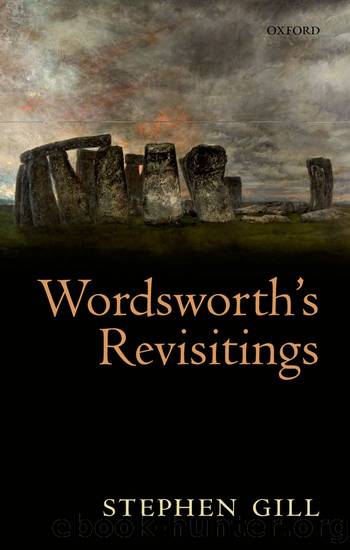Wordsworth's Revisitings by Gill Stephen;

Author:Gill, Stephen;
Language: eng
Format: epub
Publisher: Oxford University Press, Incorporated
Published: 2011-08-15T00:00:00+00:00
Figure 3. The Prelude, MS D. Dove Cottage MS 124. Reproduced courtesy of the Wordsworth Trust, Grasmere.
The young Wordsworth, fast becoming radicalized by the Pitt governmentâs response to events in France, shared Foxâs readiness to maintain faith in the foundational ideals of the Revolution, even when their lustre had been obscured by its actual course. It was Foxâs generosity of spirit towards the poor and the âconstant predominance of sensibility of heartâ that moved him always to look upon men as individuals, that prompted Wordsworth to send him a copy of Lyrical Ballads (1800). Although Foxâs love of literature was well known, it was to more than this that Wordsworth referred when he told the statesman in the accompanying letter, that he was âdear to Poetsâ, adding, âif since your first entrance into public life there has been a single true poet living in England, he must have loved youâ.32
On learning five years later that Fox was close to death, Wordsworth paid tribute in âLoud is the Valeâ to one who had been the âgloryâ and the âstayâ of âmany thousandsâ. When published in Poems, in Two Volumes in 1807, this finely restrained acknowledgement that with Foxâs âdissolutionâ a âPower is passing from the earthâ was printed appropriately in sequence with âElegiac Stanzas ⦠Peele Castleâ, Wordsworthâs lament for his brother John, and the âOde: Intimationsâ. But âLoud is the Valeâ also fits appropriately with another body of work in the collection, the âSonnets Dedicated to Libertyâ.
These poems were written during the period in which Wordsworth was brooding most intensely over what he had come to recognize as the formative years of his life and in particular over his experiences in France, in England in the immediate aftermath of the outbreak of war in 1793, and in the turbulence that followed once the French had become âoppressors in their turnâ (X, 791). The Prelude evolved into its thirteen-book form over 1803â5 as Wordsworthâs strenuous grapple with recalcitrant material and painful memories yielded a way of understanding how he had come to the conviction that he had been called to be the poet of The Recluse. In the sonnets he was, at the same time, registering his anxieties and hopes for his nation, now. The sonnets written in 1802â3 are the troubled utterances of one still in the Foxite campâhostile to Pitt, scornful of the conduct of the Kingâs ministers, fearful for the moral health of the country, convinced, nonetheless, that âEarthâs best hopes all rest with Thee!â (âEngland! the time has come â¦â). The sonnets belong with âLoud is the Valeâ. The poem on Fox does not mention history or politics once, but in honouring him as one of âthe Mightyâ it insists that he has been one of the beacons of the age.33
In the 1831 drafting Fox is presented as the âBritish Periclesâ, but this allusion to the great Athenian law-giver is without imaginative life and remains undeveloped. Again one can see why. It was a generous attempt at
Download
This site does not store any files on its server. We only index and link to content provided by other sites. Please contact the content providers to delete copyright contents if any and email us, we'll remove relevant links or contents immediately.
american english file 1 student book 3rd edition by Unknown(618)
Phoenicians among Others: Why Migrants Mattered in the Ancient Mediterranean by Denise Demetriou(613)
Verus Israel: Study of the Relations Between Christians and Jews in the Roman Empire, AD 135-425 by Marcel Simon(596)
Basic japanese A grammar and workbook by Unknown(586)
Caesar Rules: The Emperor in the Changing Roman World (c. 50 BC â AD 565) by Olivier Hekster(583)
Europe, Strategy and Armed Forces by Sven Biscop Jo Coelmont(525)
Give Me Liberty, Seventh Edition by Foner Eric & DuVal Kathleen & McGirr Lisa(503)
Banned in the U.S.A. : A Reference Guide to Book Censorship in Schools and Public Libraries by Herbert N. Foerstel(492)
The Roman World 44 BC-AD 180 by Martin Goodman(481)
DS001-THE MAN OF BRONZE by J.R.A(472)
Reading Colonial Japan by Mason Michele;Lee Helen;(472)
Introducing Christian Ethics by Samuel Wells and Ben Quash with Rebekah Eklund(470)
Imperial Rome AD 193 - 284 by Ando Clifford(459)
The Dangerous Life and Ideas of Diogenes the Cynic by Jean-Manuel Roubineau(459)
The Oxford History of World War II by Richard Overy(456)
Catiline by Henrik Ibsen--Delphi Classics (Illustrated) by Henrik Ibsen(448)
Language Hacking Mandarin by Benny Lewis & Dr. Licheng Gu(416)
Literary Mathematics by Michael Gavin;(411)
Brand by Henrik Ibsen--Delphi Classics (Illustrated) by Henrik Ibsen(406)
